Can Coffee Stay Fresh

Can Coffee Stay Fresh
Main Contents
- A. How Coffee Stay Fresh?
- B. The Many Facets of Coffee
- C. Factors Affecting the Shelf Life of Coffee
- D. How Long Does Whole Bean Coffee Last?
- E. How Long Does Ground Coffee Last?
- F. How Long Does Instant Coffee Last?
- G. General Tips for Coffee Storage
- H. Open Coffee vs. Unopened Coffee
- I. Brewed Coffee and Its Shelf Life
- J. Store Coffee
- K. Conclusion: How Long Does Coffee Last?
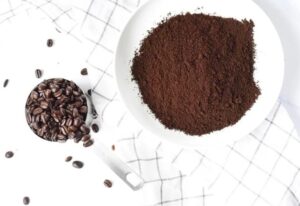
A. How Coffee Stay Fresh?
Coffee, that beloved elixir of alertness and comfort, is a daily necessity for many people around the world. Have you ever wondered, how long does coffee last?
Does it go bad, and what factors affect its shelf life?

B. The Many Facets of Coffee
Coffee is more than just beans; it comes in different forms, each with its unique characteristics and shelf life considerations:
1. Whole Coffee Beans:
In purest form of coffee, whole beans have the longest shelf life. The exterior of the bean acts as a protective barrier, preserving the beans’ flavour and aroma.
Properly stored whole beans can remain fresh for an extended period.
2. Ground Coffee:
Grinding whole coffee beans, they will begin to lose their freshness. Ground coffee has a shorter shelf life compared to whole beans. The increased surface area exposed to air accelerates the oxidation process.
3. Instant Coffee:
Instant coffee is a convenient, quick-fix option. Due to the extensive processing, instant coffee has extended shelf life than whole beans or ground coffee.
However the taste and aroma declined and no where close to fresh roasted coffee.

C. Factors Affecting the Shelf Life of Coffee
Several factors determine how long coffee lasts. Categorised into intrinsic and extrinsic:
Intrinsic Factors:
- Coffee Bean Quality:
Freshly roasted, high-quality beans tend to have a longer shelf life because they contain fewer defects and less likely to go stale quickly. - Roast Level:
The level of roast (light, medium, dark) affects the shelf life. Darker roasts tend to last longer than light roasts because the oils in the beans act as a natural barrier against oxidation.
However, too dark will increase bitterness and overshadow other flavours. - Grind Size:
In the case of ground coffee, the size of the grind matters. A finer grind has more surface area exposed to air, leading to quicker degradation. - Packaging:
The packaging of the coffee is crucial. Coffee should be stored in airtight packaging to prevent exposure to oxygen, moisture, and light, which can all degrade the quality of the coffee.
A good bag will be equipped with one-way de-gas valve to maintain coffee freshness. - Exposure to Oxygen:
Oxygen is one of the biggest enemies of coffee. Exposure to oxygen leads to oxidation, which results in the loss of flavour and aroma.
Proper sealing of the packaging is essential to prevent oxygen exposure.
Extrinsic Factors:
- Temperature:
Temperature plays a vital role in determining the shelf life of coffee. Coffee should be stored at a consistent, cool temperature. Avoid frequent temperature fluctuations, as they can cause condensation inside the container, which can spoil the coffee. - Humidity: Coffee is hygroscopic, meaning it readily absorbs moisture from the environment. High humidity can lead to coffee beans or grounds becoming stale, and in some cases, mouldy. It’s best to keep coffee in a low-humidity environment.
- Light:
Light exposure can lead to the degradation of coffee’s flavour and aroma. Coffee should be stored in opaque or UV-protected packaging to protect it from light. - Air: Proper sealing of the coffee packaging is crucial to prevent air from entering and oxidising the coffee. Vacuum-sealed containers or bags with one-way de-gas valve can help maintain freshness.
- Time: Time is the most critical factor. No matter how well you store your coffee, it will gradually lose its freshness over time. The sooner you use coffee after roasting or grinding, the better it will taste.
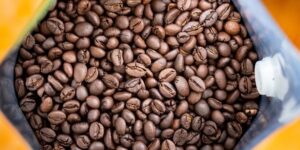
D. How Long Does Whole Bean Coffee Last?
Whole coffee beans are prized for their ability to retain freshness, making them the preferred choice for coffee aficionados. When stored correctly, whole beans can maintain their peak flavour and aroma for an extended period. Here’s a rough guideline for the shelf life of whole coffee beans:
- Freshly Roasted Beans:
Coffee beans are at their best within four to eight weeks after roasting (medium to medium-dark). During this time, they release carbon dioxide, which can affect the brewing process if used too soon. This period is often referred to as the “rest” or “de-gassing” phase. - 2 to 3 Months: Beyond the initial weeks, whole beans remain good for consumption for about two to three months, depending on various factors, such as roast level, bean quality, and storage conditions. Medium-dark roasts tend to last more than 2 months without much decline in flavours and aroma.
- Up to 6 Months:
If you’ve stored your beans exceptionally well and they were of high quality to begin with, they might still be acceptable for use up to six months after roasting. However, they won’t be as fresh as in the early weeks. - 6+ Months: While whole beans can technically last for up to a year, they will have lost a significant amount of their flavour and aroma beyond six months. They may be suitable for use for a quick perk up, but don’t expect the same quality.
To make the most of your whole coffee beans, it’s crucial to store them properly. Use an airtight packaging with de-gas valve, keep them in a cool, dark place, and consider dividing them into smaller portions to minimise exposure to air when re-opening them.

E. How Long Does Ground Coffee Last?
Ground coffee, due to its increased surface area, has a shorter shelf life compared to whole beans. However, it can still be quite enjoyable if stored correctly. Here’s what you can expect:
- Freshly Ground Coffee: Ground coffee is best consumed within a week after grinding. Decline in flavours and aroma is considerably minimal.
- 1 to 2 Weeks: If you grind your coffee at home or purchase freshly ground coffee, it’s best to use it within one to two weeks. After this period, the flavour and aroma will noticeably deteriorate.
- 2 to 4 Weeks: Ground coffee, if well stored, can still be suitable for brewing within two to four weeks of grinding. It’s essential to use an airtight packaging and avoid exposure to air, moisture, and light.
- Up to 2 Months: With exceptional storage conditions, some ground coffee may still be acceptable for use up to two months. However, unable to match the quality of freshly ground coffee.
- 3 Months+ :
Beyond three months, the flavour and aroma of ground coffee are significantly diminished. While it’s still safe to consume, the coffee experience won’t be as satisfying.
To maximise the shelf life of ground coffee, consider investing in a coffee grinder and grind your coffee just before brewing. This way, you can enjoy the freshest coffee possible.
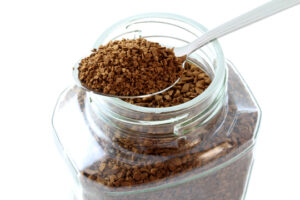
F. How Long Does Instant Coffee Last?
Instant coffee has longer shelf life as primary advantages but still need to store properly:
- Unopened Instant Coffee:
Unopened jars or packets of instant coffee can last for a year or more. The key is to keep them in a cool, dry place, away from light. - Opened Instant Coffee:
Once opened, instant coffee remains fresh for a shorter period. You should aim to use it within one to three months. Re-seal the container tightly after each use to preserve freshness. - 3 – 6 Months:
While instant coffee may technically remain safe for consumption for an extended period, most likely lose its flavour and aroma. After six months, the quality will degrade significantly.
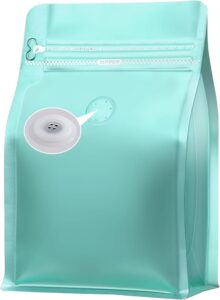
G. General Tips for Coffee Storage
To ensure the longest possible shelf life for your coffee, consider this tips:
- Buy Fresh:
Whenever possible, purchase freshly roasted coffee beans or ground coffee. The closer the coffee is to its roast date, the longer it will retain its freshness. - Airtight Packaging:
Invest in airtight containers/bags designed for coffee storage (with de-gas valve).
A proper bag with valve helps minimise exposure to oxygen, moisture, and light. - Store in a Cool, Dark Place:
Keep your coffee in a cool, dark environment. The ideal temperature range is between (10-24°C).
(Wine chiller is suitable for coffee storage as it able to control temperature and humidity.) - Avoid Refrigeration and Freezing:
Contrary to popular belief, it’s best not to store coffee in the refrigerator or freezer. These environments can introduce moisture and alter the flavour of the coffee. - Divide Into Smaller Portions:
If you buy coffee in large quantities, consider dividing it into smaller portions. This minimises the frequency of opening and closing the storage container, reducing exposure to air. - Use Quality Water:
The quality of water used for brewing also affects the taste of coffee. Ensure your water is free from impurities, at an appropriate temperature. - Grind Just Before Brewing:
If possible, grind your coffee just before brewing. This ensures the freshest cup of coffee. - Keep It Away from Strong Odours:
Coffee can absorb strong odours from its surroundings. Store it away from pungent foods or substances.
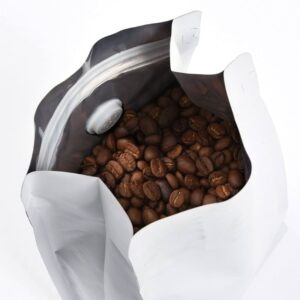
H. Open Coffee vs. Unopened Coffee
The freshness of coffee can also be affected by whether the coffee is open or unopened:
- Open Coffee:
Once you open a bag of coffee, its exposure to air accelerates the oxidation process. Ground coffee is particularly susceptible to this, which is why it’s recommended to use it within one to two weeks of opening. Whole beans can maintain their freshness longer, but it’s still advisable to consume them within a month or two of opening. - Unopened Coffee:
If stored correctly, unopened coffee can stay fresh for the duration indicated on the packaging, which often ranges from several months to a year. However, it’s still best to use unopened coffee within a reasonable time frame to enjoy its full flavour potential.
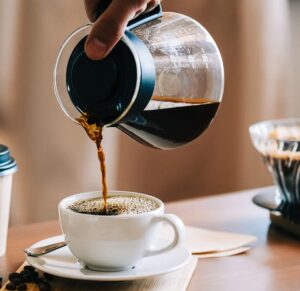
I. Brewed Coffee and Its Shelf Life
Here’s how long brewed coffee can stay fresh:
- Freshly Brewed Coffee:
For the best flavour, consume freshly brewed coffee within 30 minutes to an hour.
Coffee is at its peak immediately after brewing, and its flavours can change rapidly due to exposure to air. - Coffee Pots and Warmers:
If you use a coffee pot or warmer, keep the coffee heated at around 82-85°C. Coffee on warmers should be consumed within two hours. - Refrigeration: Leftover brewed coffee can store in an airtight container in the refrigerator for up to 24 hours. To enjoy it later, reheat gently (avoid boiling) or drink it chill.
- Iced Coffee:
Iced coffee has a longer shelf life than hot brewed coffee. It can be refrigerated for up to a week, it’s convenient option for a refreshing coffee drink.
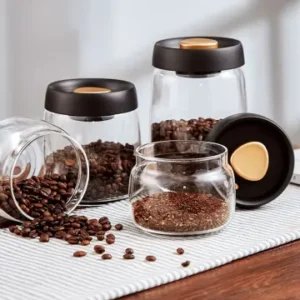
J. Store Coffee
A significant aspect of preserving coffee freshness is how it’s stored. Here are some essential storage tips to consider:
- Airtight Containers:
Store in airtight containers, should be specifically designed for coffee storage, often with a one-way valve that allows gases from fresh beans to escape without letting air in. - Cool, Dark Place:
Keep your coffee in a cool, dark place, away from direct sunlight and temperature fluctuations. - Aroma Preservation: Store your coffee away from strong-smelling substances to prevent flavour contamination.
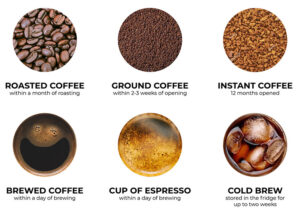
K. Conclusion: How Long Does Coffee Last?
Depends on various factors, including the type of coffee, quality, roast level, and storage conditions.
In general, whole beans and darker roasts (not too bitter over-shadow flavours) tend to have longer shelf life.
Important to prioritise freshness. Always opt for freshly roasted coffee beans or ground coffee.
If you’re a true coffee enthusiast, consider investing in a coffee grinder to enjoy the freshest coffee experience possible.
With the right storage and brewing techniques, you can savour a delightful cup of coffee every day.
It’s time for you to brew some Specialty Coffee.
Try our coffees
Every few months we sourced from different countries to select the best farm coffees harvest. We gently micro-batch drum roast all of our coffee beans in our roastery in Singapore. Indulge yourself in our flavourful coffees!
Get our fresh roast coffee beans on-demand from our Lazada and Shopee stores:
Lazada.sg/shop/soji-coffee/
Shopee.sg/soji.coffee
Or visit our shop at : 38A Beo Crescent Market #01-52 Singapore 169982 (Opening Hours > Click Here < )
-
Product on sale
![[Sample 2] ETHIOPIA YIRGACHEFFE G1 (Fruity)](https://soji.coffee/wp-content/uploads/2026/01/SAMPLE-2-Ethiopia-Yirgacheffe-500x500.jpg) [Sample 2] ETHIOPIA YIRGACHEFFE G1 (Fruity)SGD Original price was: $7.90.$0.00Current price is: $0.00.
[Sample 2] ETHIOPIA YIRGACHEFFE G1 (Fruity)SGD Original price was: $7.90.$0.00Current price is: $0.00. -
Product on sale
![[THE AFRICA SAFARIS BLEND] ETHIOPIA TRIO (LIMITED NEW! 2026](https://soji.coffee/wp-content/uploads/2025/12/The-Blends-ARTWRK-ETHIOPIA-TRIO-1-500x500.jpg) [THE AFRICA SAFARIS BLEND] ETHIOPIA TRIO (LIMITED NEW! 2026SGD Price range: $39.99 through $75.99
[THE AFRICA SAFARIS BLEND] ETHIOPIA TRIO (LIMITED NEW! 2026SGD Price range: $39.99 through $75.99 -
Product on sale
![[THE CARIBBEAN PACIFIC BLEND] COLOMBIA DUO (LIMITED NEW! 2026)](https://soji.coffee/wp-content/uploads/2025/12/The-Blends-ARTWRK-COLOMBIA-DUO-1-500x500.jpg) [THE CARIBBEAN PACIFIC BLEND] COLOMBIA DUO (LIMITED NEW! 2026)SGD Price range: $33.99 through $64.99
[THE CARIBBEAN PACIFIC BLEND] COLOMBIA DUO (LIMITED NEW! 2026)SGD Price range: $33.99 through $64.99 -
Product on sale
![[THE CARIBBEAN PACIFIC BLEND] HONDURAS+BRAZIL (LIMITED NEW! 2026)](https://soji.coffee/wp-content/uploads/2025/12/The-Blends-ARTWRK-HONBRA-1-500x500.jpg) [THE CARIBBEAN PACIFIC BLEND] HONDURAS+BRAZIL (LIMITED NEW! 2026)SGD Price range: $32.69 through $60.99
[THE CARIBBEAN PACIFIC BLEND] HONDURAS+BRAZIL (LIMITED NEW! 2026)SGD Price range: $32.69 through $60.99 -
Product on sale
![[THE CARIBBEAN PACIFIC BLEND] NICARAGUA+BRAZIL (LIMITED NEW! 2026)](https://soji.coffee/wp-content/uploads/2025/12/The-Blends-ARTWRK-NICABRA-1-500x500.jpg) [THE CARIBBEAN PACIFIC BLEND] NICARAGUA+BRAZIL (LIMITED NEW! 2026)SGD Price range: $31.89 through $59.69
[THE CARIBBEAN PACIFIC BLEND] NICARAGUA+BRAZIL (LIMITED NEW! 2026)SGD Price range: $31.89 through $59.69 -
Product on sale
![[THE KNIGHTS BLEND] Ⅲ HORSEMENS (LIMITED NEW! 2026)](https://soji.coffee/wp-content/uploads/2025/12/The-Blends-ARTWRK-THE-KNIGHTS-1-500x500.jpg) [THE KNIGHTS BLEND] Ⅲ HORSEMENS (LIMITED NEW! 2026)SGD Price range: $30.25 through $57.29
[THE KNIGHTS BLEND] Ⅲ HORSEMENS (LIMITED NEW! 2026)SGD Price range: $30.25 through $57.29 -
Product on sale
 BRAZIL SANTA MARIA CERRADO (Espresso)SGD Price range: $10.99 through $40.89
BRAZIL SANTA MARIA CERRADO (Espresso)SGD Price range: $10.99 through $40.89 -
Product on sale
 BRAZIL SUL DE MINAS (Espresso)SGD Price range: $10.99 through $40.89
BRAZIL SUL DE MINAS (Espresso)SGD Price range: $10.99 through $40.89

